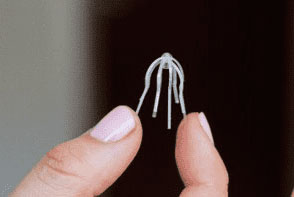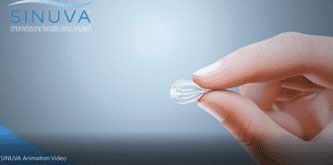


Dr. Vandana Kumra offers a non-surgical procedure for patients who suffer from repeat nasal polyps with SINUVA™ (mometasone furoate) Sinus Implant. SINUVA is proven to reduce polyps and nasal congestion and obstruction.
SINUVA is a sinus implant that treats nasal polyps without surgery. During a routine office visit, Dr. Kumra will use topical and/or local anesthesia to numb the patient’s nose and sinuses. SINUVA is then placed in the sinus cavity through the nasal opening.

Its innovative design provides a 2-in-1 approach: it is designed to open in the sinus cavity and release anti-inflammatory medicine to treat nasal polyps for up to 90 days.

The most common adverse reactions observed in a clinical trial were bronchitis, upper respiratory or middle ear infection, headache, light-headedness, asthma and nose bleed. SINUVA is indicated for adults with nasal polyps who have had ethmoid sinus surgery.
For more information about SINUVA, visit www.SINUVA.com. For education and resources on chronic sinusitis and chronic sinusitis treatment options, visit www.MySinusitis.com.
SINUVA™ Sinus Implant is a drug-releasing (mometasone furoate) implant indicated for the treatment of nasal polyps, in patients ≥ 18 years of age who have had ethmoid sinus surgery.
If you have a known hypersensitivity to the mometasone furoate drug or any of the ingredients in SINUVA, do not use SINUVA. Hypersensitivity reactions, including rash, itch, and swelling have been reported with use of steroids. If steroid effects such as Cushing Syndrome and adrenal suppression appear, consult your healthcare professional.
SINUVA is made from bioabsorbable polymers designed to soften over time. As the implant softens and polyps decrease, the implant may be expelled out of the nose on its own or with actions such as sneezing or forceful nose blowing. The implant can be removed 90 days after placement or earlier at the physician’s discretion. Repeat administration of SINUVA has not been studied.
As with other endoscopic sinus procedures, there are risks associated with the insertion or removal of SINUVA. SINUVA should be inserted by physicians trained in otolaryngology. Discuss risks related to insertion or removal of SINUVA with your healthcare professional. Your healthcare professional will monitor the nasal tissue adjacent to the SINUVA Sinus Implant for any signs of bleeding, irritation, infection, or perforation. SINUVA should not be used in patients with nasal ulcers or trauma. The most common adverse reactions observed in clinical studies were bronchitis, upper respiratory or middle ear infection, headache, lightheadedness, asthma, and nose bleed.
If you experience excessive nasal bleeding, symptoms of infection or symptoms suggesting that the implant has moved, such as irritation or a choking sensation in the back of the throat, immediately contact a healthcare professional. Close monitoring is recommended if you have a change of vision or a history of increased intraocular pressure, glaucoma and/or cataracts.
You may report side effects to your physician or to the FDA at 1-800-FDA-1088 or www.fda.gov/medwatch. You may also report side effects to Intersect ENT at 1-866-531-6004. RX Only. For important risk and use information about SINUVA, please see Full Prescribing Information or visit www.SINUVA.com.
